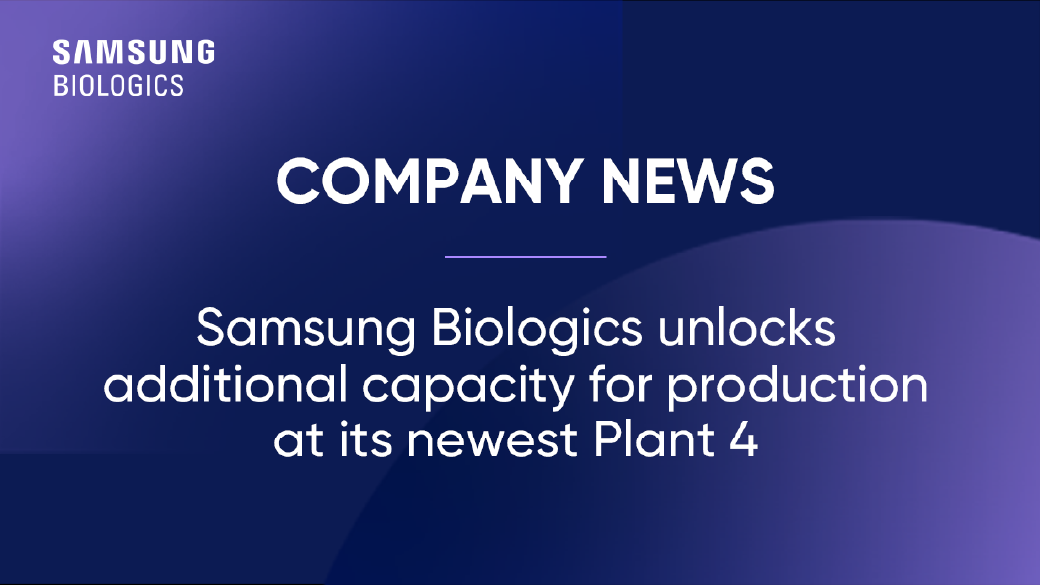Samsung Biologics unlocks additional capacity for production at its newest Plant 4

- Plant 4 commences GMP operations within just 23 months since groundbreaking, as planned
- Partial operations add fresh biomanufacturing capacity of 60,000 liters
- Plant 4’s total capacity of 240,000 liters to be ready early next year
Incheon, S. Korea, October 11, 2022 – Samsung Biologics (KRX: 207940.KS), a leading contract development and manufacturing organization (CDMO), announced today that its Plant 4 – the world’s largest single bio manufacturing plant – has commenced GMP operations this month.
Plant 4’s partial operations comes just 23 months after construction began in November 2020, adding fresh production capacity of 60,000 liters. Plant 4 will have a total capacity of 240,000 liters when it becomes fully completed in the first half of next year.
Plant 4 is expected to help Samsung Biologics maximize operational efficiency in addition to further enhancing its scale up development and manufacturing capability in response to growing biopharmaceutical demand.
“At the P4 groundbreaking ceremony in late 2020, we committed to have the plant up and running by October this year. I am very proud to have delivered on that promise, and confident that this will further solidify our position as a global leading CDMO,” said John Rim, CEO and President of Samsung Biologics. “As a trusted partner, we will continue investing domestically and globally to support our clients worldwide and provide expanded services.”
Upon the full completion of Plant 4, Samsung Biologics will boast a total capacity of 604,000 liters at Bio Campus I, the world’s largest bio manufacturing site, and account for nearly 30% of the global CDMO manufacturing capacity. Samsung Biologics has already sealed a number of large-scale manufacturing contracts with presales activities for Plant 4.
The company has also acquired additional land for Bio Campus II, which will host Plants 5 through 8, as well as an Open Innovation Center. Construction is set to begin later this year and will be 30% larger in size compared to Bio Campus I.

- Plant 4 commences GMP operations within just 23 months since groundbreaking, as planned
- Partial operations add fresh biomanufacturing capacity of 60,000 liters
- Plant 4’s total capacity of 240,000 liters to be ready early next year
Incheon, S. Korea, October 11, 2022 – Samsung Biologics (KRX: 207940.KS), a leading contract development and manufacturing organization (CDMO), announced today that its Plant 4 – the world’s largest single bio manufacturing plant – has commenced GMP operations this month.
Plant 4’s partial operations comes just 23 months after construction began in November 2020, adding fresh production capacity of 60,000 liters. Plant 4 will have a total capacity of 240,000 liters when it becomes fully completed in the first half of next year.
Plant 4 is expected to help Samsung Biologics maximize operational efficiency in addition to further enhancing its scale up development and manufacturing capability in response to growing biopharmaceutical demand.
“At the P4 groundbreaking ceremony in late 2020, we committed to have the plant up and running by October this year. I am very proud to have delivered on that promise, and confident that this will further solidify our position as a global leading CDMO,” said John Rim, CEO and President of Samsung Biologics. “As a trusted partner, we will continue investing domestically and globally to support our clients worldwide and provide expanded services.”
Upon the full completion of Plant 4, Samsung Biologics will boast a total capacity of 604,000 liters at Bio Campus I, the world’s largest bio manufacturing site, and account for nearly 30% of the global CDMO manufacturing capacity. Samsung Biologics has already sealed a number of large-scale manufacturing contracts with presales activities for Plant 4.
The company has also acquired additional land for Bio Campus II, which will host Plants 5 through 8, as well as an Open Innovation Center. Construction is set to begin later this year and will be 30% larger in size compared to Bio Campus I.
Share article
Related Content